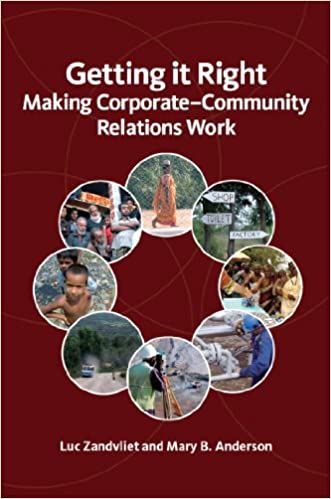A company begins exploration of future operations in a remote and rural area of a poor, but resource-rich country. The communities in this area welcome the company's interest, seeing the prospects for improved social and economic conditions. They look forward to the creation of jobs and other income opportunities, and they look forward to being connected to the outside world through the company.The company, for its part, wants to get it right with local communities. In order to understand the context in which they plan to operate as well as to demonstrate their respect for local mores, managers hire an anthropologist or a non-governmental organization (NGO) to do community surveys. They see these as the first steps for establishing good relations between the company and local communities.Five years later, a visitor to the area sees schools and clinics that the company has built and staffed for the community. He sees upgraded roads and electricity that had not existed before. He sees increased activity in the region, more people and more vehicles, as people have migrated to the area for work. But he hears the company manager complain that he spends far too much time dealing with the community's "never-ending demands" and with "local trouble-makers," and he hears community members complain that "the company has done nothing for us."This book has been written for corporate managers who are responsible for company operations in societies that are poor and politically unstable. Many such managers are frustrated with the situations they face. They try their best to run effective, profitable and beneficial operations that take account of the needs of all their stakeholders, including local surrounding communities. But, even with their best efforts, they encounter community dissatisfaction, unrest, opposition, and delays and, worse yet, threats and violence.In many ways, this book is also written *by* such managers because the information and learning it includes come directly from their day-to-day, grounded field experience. For seven years the authors have spent days and weeks at over 25 sites of companies – including (among others) BP, ChevronTexaco, Barrick, Shell, Total, and Newmont – operating in Africa, Asia, Latin America, Australia, and North America, talking with both company staff and local people. They have gathered evidence of how the daily, ongoing operations of companies interact with, affect, and are affected by the societies where they work. They have heard lots of complaints – on both sides. They have seen policies and programs, intended to establish positive relations, backfire and, instead, bring angry demonstrations at the company gate and seemingly endless negotiations and demands. They have also seen operations that are appreciated and supported by local people because of the positive impacts they have had.Both corporations and communities begin their interactions with positive attitudes and expectations, but in a short time tensions between the two rise and negative attitudes can supplant positive ones. In each location where CEP has seen this story play out, there are, of course, variations and details that reflect the specific context and local history. But the regularity and similarity of complaints across so many contexts also show that there are clear, and predictable, patterns in the processes by which company–community relations turn sour.Getting it Right reports, analyzes, and sorts the broad and varied experiences of these many corporations, bringing forward the lessons that can be usefully applied in other settings. The aim is to help corporate managers *get it right* with respect to interactions with local communities, so that they can more efficiently and effectively accomplish their production goals and, at the same time, ensure that local communities are better (rather than worse) off as a result of their presence. The book also addresses what has been learned about how companies can interact, appropriately and positively, with national governments and advocacy NGOs in ways that promote, rather than undermine, the welfare of the citizens of the countries where they operate.The book provides a treasure trove of practical experience against which other managers can analyze their own situations and, using what has been learned by smart colleagues before them, arrive at sound, practical approaches to their daily challenges.Getting it Right will be an indispensable resource for all managers working in community relations or responsible for operations in difficult locations, as well as for students of development studies, corporate social responsibility, sustainable development, the extractive industries, and stakeholder management.
چکیده فارسی
یک شرکت اکتشاف عملیات آینده را در یک منطقه دورافتاده و روستایی کشوری فقیر اما غنی از منابع آغاز می کند. جوامع در این منطقه با مشاهده چشم انداز بهبود شرایط اجتماعی و اقتصادی از علاقه شرکت استقبال می کنند. آنها مشتاقانه منتظر ایجاد شغل و سایر فرصت های درآمدی هستند و مشتاقانه منتظر هستند که از طریق شرکت به دنیای خارج متصل شوند. این شرکت به نوبه خود می خواهد آن را با جوامع محلی به درستی انجام دهد. مدیران برای درک زمینه ای که قصد دارند در آن فعالیت کنند و همچنین برای نشان دادن احترام خود به آداب و رسوم محلی، یک انسان شناس یا یک سازمان غیردولتی (NGO) را برای انجام نظرسنجی های اجتماعی استخدام می کنند. آنها این را اولین گام برای ایجاد روابط خوب بین شرکت و جوامع محلی می دانند. پنج سال بعد، یکی از بازدیدکنندگان منطقه مدارس و کلینیک هایی را می بیند که شرکت برای جامعه ساخته و پرسنل ساخته است. او جاده های ارتقا یافته و برق را می بیند که قبلا وجود نداشته است. او افزایش فعالیت در منطقه، جمعیت بیشتر و وسایل نقلیه بیشتر را می بیند، زیرا مردم برای کار به منطقه مهاجرت کرده اند. اما او می شنود که مدیر شرکت شکایت می کند که زمان زیادی را صرف رسیدگی به "خواسته های بی پایان" جامعه و "مشکل سازان محلی" می کند، و می شنود که اعضای جامعه شکایت می کنند که "شرکت هیچ کاری برای ما انجام نداده است." این کتاب برای مدیران شرکتی نوشته شده است که مسئولیت عملیات شرکت در جوامع فقیر و از نظر سیاسی بی ثبات هستند. بسیاری از این مدیران از موقعیت هایی که با آن مواجه می شوند ناامید هستند. آنها تمام تلاش خود را می کنند تا عملیات مؤثر، سودآور و سودمندی را اجرا کنند که نیازهای همه سهامدارانشان از جمله جوامع محلی اطراف را در نظر بگیرد. اما، حتی با بهترین تلاش خود، با نارضایتی، ناآرامی، مخالفت و تاخیر و بدتر از آن، تهدید و خشونت مواجه میشوند. از بسیاری جهات، این کتاب *توسط* چنین مدیرانی نیز نوشته شده است، زیرا اطلاعات و یادگیری آن شامل میشود. مستقیماً از تجربیات میدانی روزانه و زمینی آنها. نویسندگان به مدت هفت سال روزها و هفتهها را در بیش از 25 سایت شرکت - از جمله BP، ChevronTexaco، Barrick، Shell، Total و Newmont - در آفریقا، آسیا، آمریکای لاتین، استرالیا و آمریکای شمالی سپری کردهاند. صحبت با کارکنان شرکت و مردم محلی. آنها شواهدی از چگونگی تعامل روزانه و مداوم شرکت ها با جوامعی که در آن کار می کنند، تحت تاثیر قرار می دهند، جمع آوری کرده اند. آنها شکایات زیادی از هر دو طرف شنیده اند. آنها سیاستها و برنامههایی را دیدهاند که برای برقراری روابط مثبت، نتیجه معکوس میدهند و در عوض، تظاهراتهای خشمگینانه را در دروازه شرکت و مذاکرات و خواستههای به ظاهر بیپایان میآورند. آنها همچنین عملیات هایی را دیده اند که توسط مردم محلی به دلیل تأثیرات مثبتی که داشته اند مورد قدردانی و حمایت قرار گرفته است. هم شرکت ها و هم جوامع تعاملات خود را با نگرش ها و انتظارات مثبت آغاز می کنند، اما در مدت کوتاهی تنش بین این دو افزایش می یابد و نگرش منفی می تواند جایگزین شود. موارد مثبت در هر مکانی که CEP این داستان را مشاهده کرده است، البته، تغییرات و جزئیاتی وجود دارد که منعکس کننده زمینه خاص و تاریخ محلی است. اما منظم بودن و شباهت شکایات در بسیاری از زمینهها همچنین نشان میدهد که الگوهای واضح و قابل پیشبینی در فرآیندهایی وجود دارد که روابط شرکت و جامعه بدتر میشود. Getting it Right تجربیات گسترده و متنوع این موارد را گزارش، تجزیه و تحلیل و دستهبندی میکند. بسیاری از شرکتها، درسهایی را ارائه میکنند که میتوانند به طور مفید در تنظیمات دیگر اعمال شوند. هدف این است که به مدیران شرکت کمک کنیم *درست کنند* با توجه به تعاملات با جوامع محلی، به طوری که آنها بتوانند به طور موثرتر و موثرتر اهداف تولید خود را به انجام برسانند و در عین حال، اطمینان حاصل کنند که جوامع محلی بهتر (و نه بدتر) هستند. در نتیجه حضور آنها خاموش شد. این کتاب همچنین به آنچه آموخته شده است درباره نحوه تعامل مناسب و مثبت شرکتها با دولتهای ملی و حمایت از سازمانهای غیردولتی به شیوههایی که به جای تضعیف، رفاه شهروندان کشورهایی که در آن فعالیت میکنند، میپردازد. این کتاب گنجینهای را فراهم میکند. مجموعه ای از تجربیات عملی که مدیران دیگر می توانند با استفاده از آن موقعیت های خود را تجزیه و تحلیل کنند و با استفاده از آنچه که توسط همکاران باهوش قبل از آنها آموخته اند، به رویکردهای درست و عملی برای چالش های روزانه خود دست یابند. درست کردن آن منبعی ضروری برای همه مدیرانی خواهد بود که در آن کار می کنند. روابط جامعه یا مسئول عملیات در مکانهای دشوار، و همچنین برای دانشجویان مطالعات توسعه، مسئولیت اجتماعی شرکت، توسعه پایدار، صنایع استخراجی، و مدیریت سهامداران.
ادامه ...
بستن ...










